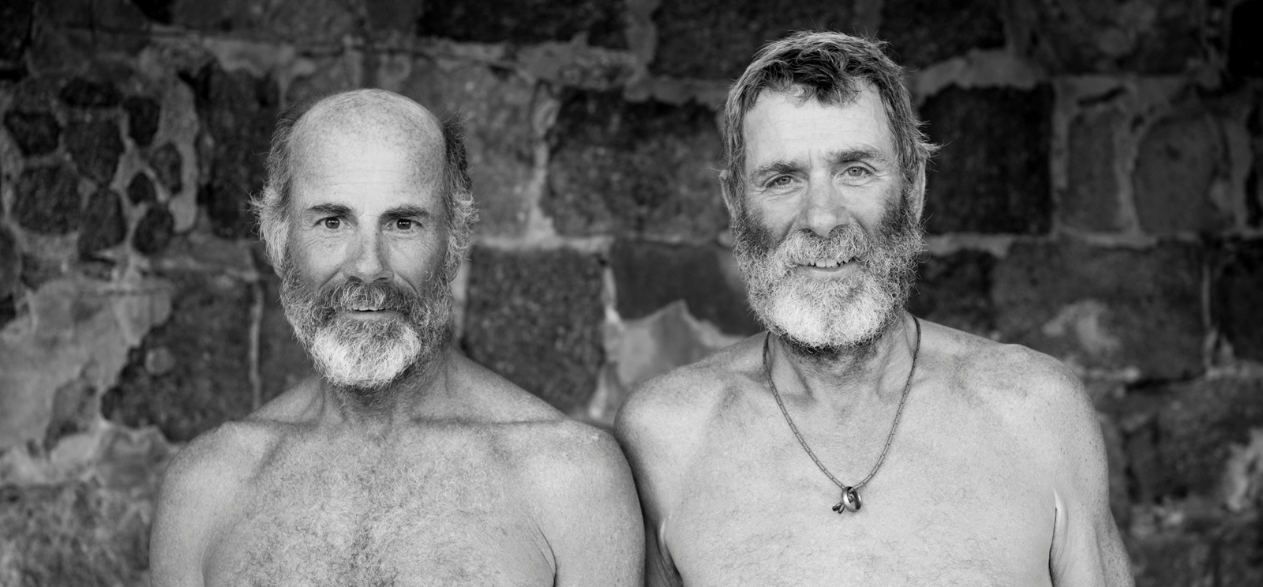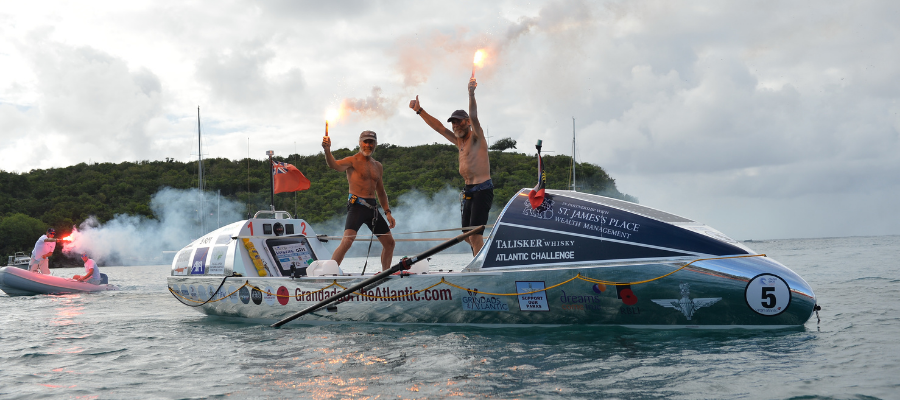
Sixty-Three Days at Sea
In 2019, Neil Young and Peter Ketley set a new Guinness World Record: they were declared the oldest pair to have ever rowed across any ocean. The ex-paratroopers had a combined age of 123 when they set out on the 2018 Talisker Whisky Atlantic Challenge — branded ‘the world’s toughest row’. They spent 63 days at sea during the grueling 3,000-mile race across the Atlantic, from the Canary Islands to Antigua.
A year later, Firepot caught up with Neil, one half of the so-called ‘Grandads of the Atlantic’, to find out what it’s actually like to row one of the world’s great oceans.
Did you set out to win a world record?
We didn’t even realise we were in a position to do so until shortly before we began — I don’t think we appreciated how old we were! For us, the race was always about setting ourselves a challenge. I’m limited in the sports I can do due to a dodgy knee, so rowing felt like a good fit. At the ages of 62 and 61, Peter and I never expected to win a race against people half our age. We decided to make the crossing as enjoyable as possible: if we saw whales, we wanted to stop; if we lost a day to bad weather, we didn’t want to sit there stewing. We spoke with previous contestants who’d told us they spent so much energy trying to make a certain time, they didn’t enjoy the experience. We didn’t want that for ourselves.
Did your age help or hinder you?
While we were still training, Peter and I had moments where we questioned our sanity: there had to be a reason why people our age hadn’t rowed the Atlantic before - not in a two-man boat, at least. But we quickly realised our mental attitude would be an incredibly important factor in succeeding.
Rowing an ocean is as much a mental challenge as a physical one. Both Peter and I served in the Parachute Regiment as young men. It makes you tough both physically and mentally. I’m not going to pretend we spent the whole challenge laughing: it was physically very hard, especially the first 10 days as we worked our way into a routine. But Peter and I didn’t have a single argument in 63 days. Our age and years of friendship definitely helped. And some of the challenges you face rowing an ocean don’t account for age: we were really lucky neither of us got seasick — that can knock anyone down.
How did your military career influence your decision to make the crossing?
People who join the military tend to be looking for adventure and challenges to start with. You’re then moulded into a soldier, mentally and physically. You learn to work in small teams, to be disciplined. I left the military in 1983, but that training is something that stays with you. Rowing the Atlantic is a fitting (if extreme) way to use those select skills. Things like keeping the boat tidy and hygiene levels high were second nature to both of us.

There’s not a lot of room on the boat for non-essentials — what was the one luxury item you allowed yourself to pack?
The night before we flew out to the Canary Islands, my younger son, his wife, and their daughter gave me a present with strict instructions not to open it until the day I left. They’d put together a ‘Day Tracker’; every day I turned a page, and it would have a different message and photo — mostly pictures of my beautiful granddaughter, Millie, with other members of my family. I never cheated and flipped open more than one day at a time. It gave me something to look forward to every day; stimulation to break what very quickly becomes a monotony of familiar sounds, sights and smells. It was the nicest present I’ve had in my life. My whole family’s support meant the world to me.
What was the biggest challenge of your Atlantic crossing?
We had pretty dreadful weather throughout our crossing — we ended up at sea for much longer than planned. If you’re rowing the Atlantic, bad weather is the opposite of what you’d expect: still days, no wind and not enough big waves to push you along. 63 days at sea is a very, very long time, especially when your shelter is a tiny cabin that regularly tops 40 degrees Celsius.
We also had major technical issues: within the first 12 days, both of our auto-helms — essentially automatic steering devices — broke. We had no choice but to steer manually for 28 days solid. It was exhausting and very demoralising. Eventually, around day 40, we managed a partial fix. But that definitely increased the challenge as a whole.
What was the scariest moment?
The first was starting the race, although that was perhaps more a mixed feeling of excitement with apprehension than pure fear. When we set out from La Gomera in the Canary Islands, we were heading into the unknown. Neither Peter nor I had any real maritime experience: we started this challenge from zero. All our training was near Portsmouth, always within sight of the coastline. So beginning the crossing was a huge moment psychologically. And of course it’s hard to believe a tiny little rowing boat can weather an ocean. It took us a while to wrap our heads around that: the boats are phenomenally well constructed — they’re like little corks that just go over the tops of the biggest waves.

The second was more physically dangerous. On day 45, we noticed the battery compartment of our boat was open and filling up with water. Mindful of the risk of electrical fire, we both knelt down side-by-side to scoop the water out with sponges. After a while, I happened to look over my shoulder and saw a colossal wave coming towards the side of the boat. It must have been 40 feet high. I slammed the hatch down and bellowed at Peter to hold onto the boat. The wave broke right over us. We were incredibly lucky not to be injured: when we picked up the carbon fibre oars to get going again, one of them was shattered and the force of the wave had bent the outrigger and rowlock out of shape.
Did you have any special encounters with animals?
We had two encounters with whales that were incredible. The first was a mother with two babies; they swam just off the boat for almost an hour. The second was a single whale that swam under the boat over and over again. The very last time it passed under, the whale rolled onto its back and rolled its white belly up towards the white bottom of our boat. It felt like it was waving goodbye to us.
One night, when we were getting close to Antigua, I heard Peter calling my name, so I poked my head out of the cabin. He told me there was a bird sitting on his head. I thought he was playing a prank — that he’d plonked a pair of socks on his head. But it wasn’t. The bird stayed with us for hours, flying off every now and again then coming back a few minutes later.

What are the most important qualities a teammate needs?
Commitment and determination are top of the list. The whole point of rowing in a team, no matter the size, is having someone else to rely on. You don’t want to be stuck in the middle of the Atlantic with someone who doubts themselves. You have to believe you can do it. You also need discipline. Even in a pair, there’s still plenty of opportunity to fall out when you’re spending months at sea in a confined space. You never want to feel like someone else is slacking: that’s a recipe for disaster. Finally, you need a sense of humour. Things go wrong and you need to be able to deal with them when they do.
How did your diet change at sea?
Having planned to eat five meals a day, we never ate more than two. It came as a real surprise but being at sea really messed with our appetites. When we did eat, it was important to cook something we were going to enjoy: Firepot meals became an important ritual in our day. Even in hot weather, a warm meal is very comforting when you’re under such physical and mental strain. In between meals, we snacked on biltong and chocolate. Peter had brought so much chocolate that he was begging me to help him get through it by the end of the crossing.
What does it feel like to finally catch sight of land?
Incredible. It was the moment we realised we were going to make it. We knew our families were waiting for us. The elation of what we’d done started to trickle in.

How long does it take to get used to land legs again?
After so long spent in constant motion, my legs turned to jelly when I stepped onto the dock. My sons, James and Rob, had to prop me up while I was being interviewed and I couldn’t stop shaking. Even when I lay down it felt like the bed was pitching and rocking. It took me four or five days to feel normal again.
What was the first meal you ate when you got off the boat?
It’s a tradition that everyone who completes the Talisker Atlantic Whisky Challenge goes straight to one particular restaurant in Nelson's Dockyard and eats hamburgers and chips. But after so long at sea, the only thing we wanted was a Full English Breakfast. We ate heaps of eggs, bacon and sausages, washed down with a big pot of tea and some fresh mango juice.
When did your achievement start to sink in?
The second night after we finished, I went for a meal on Shirley Heights with some of the other rowers, our families and friends. We stopped on the edge of the cliffs on the way up to look out over the ocean. My son turned to me and asked if I could believe I’d just rowed over the whole thing. It was strange, because I almost couldn’t — the scale was just too big.
Would you do it again?
Never say never, but I haven’t seriously considered it yet. A few months after I came home, my granddaughter turned to me and said “I don’t ever want you to go to sea again, you were gone too long!” She was only three when I left and I missed her terribly: we’re very close. Young kids don’t really understand the concept of the ‘Atlantic’ or ‘ocean’. They see the sea as a small strip of water to paddle in during summer. Kids grow so incredibly quickly at that age, I don’t want to miss anything. That said, if either of my sons wanted to do it, I would go again without a moment's hesitation.

How has it changed you?
My biggest takeaway from rowing the Atlantic is that life is short. As you get older, time goes by quicker and quicker. I’m much more aware of how lucky I am to be alive and how health should be your number one priority. If you’re not healthy, you can’t enjoy many of the other things life has to offer, including time with your family.
After I returned home, I was hypersensitive to the amount of time people waste looking at their phones. I crave adventure: being in the wild, where no-one else is. Next year, I’m hoping to do a high-altitude trek in Nepal’s Himalayas. I’ve never been that high, except hooked up to a parachute. I can’t predict what my reaction will be; I’m excited by that unknown and grateful that, once again, my wife, Jill, is so supportive of my decision to go.
Finally, if you could describe the experience in three words, what would they be?
Challenging. Frustrating. Satisfying.

Image credits: Ted Martin

